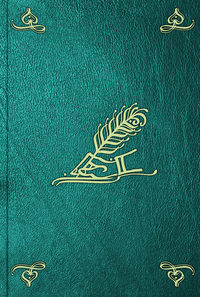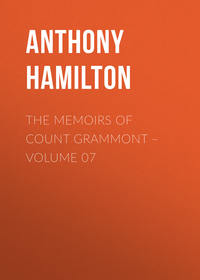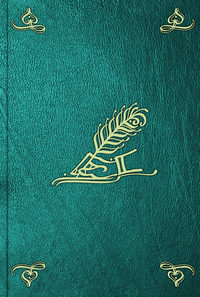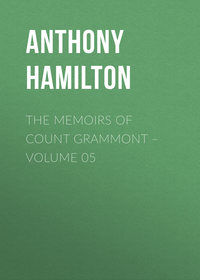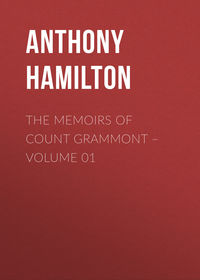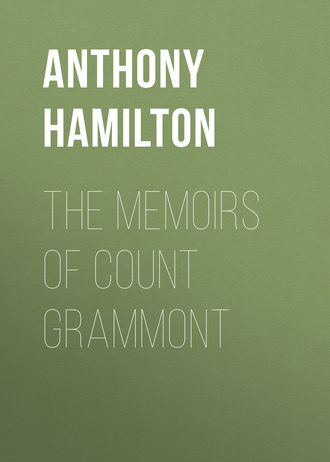 полная версия
полная версияThe Memoirs of Count Grammont
“Since you are my wife’s gallant – ” “I!” said Matta who wished to carry it discreetly: “those who told you so, told a damned lie.” “Zounds, sir,” said the Marquis, “you speak in a tone which does not at all become you; for I would have you to know, notwithstanding your contemptuous airs, that the Marchioness de Senantes is perhaps as worthy of your attentions as any of your French ladies, and that I have known some greatly your superiors, who have thought it an honour to serve her.” “Very well,” said Matta, “I think she is very deserving, and since you insist upon it, I am her servant and gallant, to oblige you.”
“You think, perhaps,” continued the other, “that the same custom prevails in this country as in your own, and that the ladies have lovers, with no other intentions than to grant them favours: undeceive yourself if you please, and know, likewise, that even if such events were frequent in this court, I should not be at all uneasy.” “Nothing can be more civil,” said Matta; “but wherefore would you not?” “I will tell you why,” replied he: “I am well acquainted with the affection my wife entertains for me: I am acquainted with her discretion towards all the world; and, what is more, I am acquainted with my own merit.”
“You have a most uncommon acquaintance then,” replied Matta; “I congratulate you upon it; I have the honour to drink it in a bumper.” The Marquis pledged him; but seeing that the conversation dropped on their ceasing to drink, after two or three healths, he wished to make a second attempt, and attack Matta on his strong side, that is to say, on his learning.
He desired him, therefore, to tell him, at what time he thought the Allobroges came to settle in Piedmont. Matta, who wished him and his Allobroges at the devil, said, that it must be in the time of the civil wars. “I doubt that,” said the other. “Just as you like,” said Matta. “Under what consulate?” replied the Marquis: “Under that of the League,” said Matta, “when the Guises brought the Lansquenets into France; but what the devil does that signify?”
The Marquis was tolerably warm, and naturally savage, so that God knows how the conversation would have ended, if the Chevalier de Grammont had not unexpectedly come in to appease them. It was some time before he could find out what their debate was; for the one had forgotten the questions, and the other the answers, which had disobliged him, in order to reproach the Chevalier with his eternal passion for play, which made him always uncertain. The Chevalier, who knew that he was still more culpable than they thought, bore it all with patience, and condemned himself more than they desired: this appeased them; and the entertainment ended with greater tranquillity than it had begun. The conversation was again reduced to order; but he could not enliven it as he usually did. He was in very ill humour, and as he pressed them every minute to rise from table, the Marquis was of opinion that he had lost a great deal. Matta said, on the contrary, that he had won; but for want of precautions had made perhaps an unfortunate retreat; and asked him if he had not stood in need of Serjeant La Place, with his ambuscade.
This piece of history was beyond the comprehension of the Marquis, and being afraid that Matta might explain it, the Chevalier changed the discourse, and was for rising from table; but Matta would not consent to it. This effected a reconciliation between him and the Marquis, who thought this was a piece of civility intended for him; however, it was not for him, but for his wine, to which Matta had taken a prodigious liking.
The Duchess, who knew the character of the Marquis, was charmed with the account which the Chevalier de Grammont gave her of the entertainment and conversation: she sent for Matta to know the truth of it from himself: he confessed, that before the Allobroges were mentioned the Marquis was for quarrelling with him, because he was not in love with his wife.
Their acquaintance having begun in this manner, all the esteem which the Marquis had formerly expressed for the Chevalier seemed now directed towards Matta: he went every day to pay Matta a visit, and Matta was every day with his wife. This did not at all suit the Chevalier: he repented of his having chid Matta, whose assiduity now interrupted all his schemes; and the Marchioness was still more embarrassed. Whatever wit a man may have, it will never please where his company is disliked; and she repented that she had been formerly guilty of some trifling advances towards him.
Matta began to find charms in her person, and might have found the same in her conversation, if she had been inclined to display them; but it is impossible to be in good humour with persons who thwart our designs. While his passion increased, the Chevalier de Grammont was solely occupied in endeavouring to find out some method, by which he might accomplish his intrigue; and this was the stratagem which he put in execution to clear the coast, by removing, at one and the same time, both the lover and the husband.
He told Matta, that they ought to invite the Marquis to supper at their lodgings, and he would take upon himself to provide everything proper for the occasion. Matta desired to know if it was to play at quinze, and assured him that he should take care to render abortive any intention he might have to engage in play, and leave him alone with the greatest blockhead in all Europe. The Chevalier de Grammont did not entertain any such thought, being persuaded that it would be impossible to take advantage of any such opportunity, in whatever manner he might take his measures, and that they would seek for him in every corner of the city rather than allow him the least repose: his whole attention was therefore employed in rendering the entertainment agreeable, in finding out means of prolonging it, in order ultimately to kindle some dispute between the Marquis and Matta. For this purpose he put himself in the best humour in the world, and the wine produced the same effect on the rest of the company.
The Chevalier de Grammont expressed his concern, that he had not been able to give the Marquis a little concert, as he had intended in the morning; for the musicians had been all pre-engaged. Upon this the Marquis undertook to have them at his country-house the following evening, and invited the same company to sup with him there. Matta asked what the devil they wanted with music, and maintained that it was of no use on such occasions but for women who had something to say to their lovers, while the fiddles prevented them from being overheard, or for fools who had nothing to say when the music ended. They ridiculed all his arguments: the party was fixed for the next day, and the music was voted by the majority of voices. The Marquis, to console Matta, as well as to do honour to the entertainment, toasted a great many healths: Matta was more ready to listen to his arguments on this topic than in a dispute; but the Chevalier, perceiving that a little would irritate them, desired nothing more earnestly than to see them engaged in some new controversy. It was in vain that he had from time to time started some subject of discourse with this intention; but having luckily thought of asking what was his lady’s maiden name, Senantes, who was a great genealogist, as all fools are who have good memories, immediately began by tracing out her family, by an endless confused string of lineage. The Chevalier seemed to listen to him with great attention; and perceiving that Matta was almost out of patience, he desired him to attend to what the Marquis was saying, for that nothing could be more entertaining. “All this may be very true,” said Matta; “but for my part, I must confess, if I were married, I should rather choose to inform myself who was the real father of my children, than who were my wife’s grand fathers.” The Marquis, smiling at this rudeness, did not leave off until he had traced back the ancestors of his spouse, from line to line, as far as Yolande de Senantes: after this he offered to prove, in less than half an hour, that the Grammonts came originally from Spain. “Very well,” said Matta, “and pray what does it signify to us from whence the Grammonts are descended? Do not you know, sir, that it is better to know nothing at all, than to know too much?”
The Marquis maintained the contrary with great warmth, and was preparing a formal argument to prove that an ignorant man is a fool; but the Chevalier de Grammont, who was thoroughly acquainted with Matta saw very clearly that he would send the logician to the devil before he should arrive at the conclusion of his syllogism: for which reason, interposing as soon as they began to raise their voices, he told them it was ridiculous to quarrel about an affair in itself so trivial, and treated the matter in a serious light, that it might make the greater impression. Thus supper terminated peaceably, owing to the care he took to suppress all disputes, and to substitute plenty of wine in their stead.
The next day Matta went to the chase, the Chevalier de Grammont to the bagnio, and the Marquis to his country house. While the latter was making the necessary preparations for his guests, not forgetting the music, and Matta pursuing his game to get an appetite, the Chevalier was meditating on the execution of his project.
As soon as he had regulated his plan of operations in his own mind, he privately sent anonymous intelligence to the officer of the guard at the palace that the Marquis de Senantes had had some words with Monsieur de Matta the preceding night at supper; that the one had gone out in the morning; and the other could not be found in the city.
Madame Royale, alarmed at this advice, immediately sent for the Chevalier de Grammont: he appeared surprised when her highness mentioned the affair: he confessed, indeed, that some high words had passed between them, but that he did not believe either of them would have remembered them the next day. He said that if no mischief had yet taken place, the best way would be to secure them both until the morning, and that if they could be found, he would undertake to reconcile them, and to obliterate all grievances: in this there was no great difficulty. On inquiry at the Marquis’s they were informed that he was gone to his country-house: there certainly he was, and there they found him; the officer put him under an arrest, without assigning any reason for so doing, and left him in very great surprise.
Immediately upon Matta’s return from hunting, her Royal Highness sent the same officer to desire him to give her his word that he would not stir out that evening. This compliment very much surprised him, more particularly as no reason was assigned for it. He was expected at a good entertainment he was dying with hunger, and nothing appeared to him more unreasonable than to oblige him to stay at home, in a situation like the present; but he had given his word, and not knowing to what this might tend, his only resource was to send for his friend; but his friend did not come to him until his return from the country. He had there found the Marquis in the midst of his fiddlers, and very much vexed to find himself a prisoner in his own house on account of Matta, whom he was waiting for in order to feast him: he complained of him bitterly to the Chevalier de Grammont: he said that he did not believe that he had offended him; but that, since he was very desirous of a quarrel, he desired the Chevalier to acquaint him, if he felt the least displeasure on the present occasion, he should, on the very first opportunity, receive what is called satisfaction. The Chevalier de Grammont assured him that no such thought had ever entered the mind of Matta; that on the contrary, he knew that he very greatly esteemed him; that all this could alone arise from the extreme tenderness of his lady, who, being alarmed upon the report of the servants who waited at table, must have gone to her Royal Highness, in order to prevent any unpleasant consequences; that he thought this the more probable, as he had often told the Marchioness, when speaking of Matta, that he was the best swordsman in France; for, in truth, the poor gentleman had never fought without having the misfortune of killing his man.
The Marquis, being a little pacified, said he was very much obliged to him, that he would severely chide his wife for her unseasonable tenderness, and that he was extremely desirous of again enjoying the pleasure of his dear friend Matta’s company.
The Chevalier de Grammont assured him that he would use all his endeavours for that purpose, and at the same time gave strict charge to his guard not to let him escape without orders from the Court, as he seemed fully bent upon fighting, and they would be responsible for him: there was no occasion to say more to have him strictly watched, though there was no necessity for it.
One being thus safely lodged, his next step was to secure the other: he returned immediately to town: and as soon as Matta saw him, “What the devil,” said he, “is the meaning of this farce which I am obliged to act? for my part, I cannot understand the foolish customs of this country; how comes it that they make me a prisoner upon my parole?” “How comes it?” said the Chevalier de Grammont, “it is because you yourself are far more unaccountable than all their customs; you cannot help disputing with a peevish fellow, whom you ought only to laugh at; some officious footman has no doubt been talking of your last night’s dispute; you were seen to go out of town in the morning, and the Marquis soon after; was not this sufficient to make her Royal Highness think herself obliged to take these precautions? The Marquis is in custody; they have only required your parole; so far, therefore, from taking the affair in the sense you do, I should send very humbly to thank her Highness for the kindness she has manifested towards you in putting you under arrest, since it is only on your account that she interests herself in the affair. I shall take a walk to the palace, where I will endeavour to unravel this mystery; in the mean time, as there is but little probability that the matter should be settled this evening, you would do well to order supper; for I shall come back to you immediately.”
Matta charged him not to fail to express to her Royal Highness the grateful sense he had of her favour, though in truth he as little feared the Marquis as he loved him; and it is impossible to express the degree of his fortitude in stronger terms.
The Chevalier de Grammont returned in about half an hour, with two or three gentlemen whom Matta had got acquainted with at the chase, and who, upon the report of the quarrel, waited upon him, and each offered him separately his services against the unassisted and pacific Marquis. Matta having returned them his thanks, insisted upon their staying supper, and put on his robe de chambre.
As soon as the Chevalier de Grammont perceived that every thing coincided with his wishes, and that towards the end of the entertainment the toasts went merrily round, he knew he was sure of his man till next day: then taking him aside with the permission of the company, and making use of a false confidence in order to disguise a real treachery, he acquainted him, after having sworn him several times to secrecy, that he had at last prevailed upon the little Saint Germain to grant him an interview that night; for which reason he would take his leave, under pretence of going to play at Court; he therefore desired him fully to satisfy the company that he would not have left them on any other account, as the Piedmontese are naturally mistrustful. Matta promised he would manage this point with discretion; that he would make an apology for him, and that there was no occasion for his personally taking leave: then, after congratulating him upon the happy posture of his affairs, he sent him away with all the expedition and secrecy imaginable; so great was his fear lest his friend should lose the present opportunity.
Matta then returned to the company, much pleased with the confidence which had been placed in him, and with the share he had in the success of this adventure. He put himself into the best humour imaginable in order to divert the attention of his guests; he severely satirised those, whose rage for gaming induced them to sacrifice to it every other consideration; he loudly ridiculed the folly of the Chevalier upon this article, and secretly laughed at the credulity of the Piedmontese, whom he had deceived with so much ingenuity.
It was late at night before the company broke up, and Matta went to bed, very well satisfied with what he had done for his friend; and, if we may credit appearances, this friend enjoyed the fruit of his perfidy. The amorous Marchioness received him like one who wished to enhance the value of the favour she bestowed; her charms were far from being neglected; and if there are any circumstances in which we may detest the traitor while we profit by the treason, this was not one of them; and however successful the Chevalier de Grammont was in his intrigues, it was not owing to him that the contrary was not believed; but, be that as it may, being convinced that in love whatever is gained by address is gained fairly, it does not appear that he ever showed the smallest degree of repentance for this trick. But it is now time for its to take him from the court of Savoy, to see him shine in that of France.
CHAPTER FIFTH. HE RETURNS TO THE COURT OF FRANCE – HIS ADVENTURES AT THE SIEGE OF ARRAS – HIS REPLY TO CARDINAL MAZARIN – HE IS BANISHED THE COURT
The Chevalier de Grammont, upon his return to France, sustained, with the greatest success, the reputation he had acquired abroad: alert in play, active and vigilant in love; sometimes successful, and always feared, in his intrigues; in war alike prepared for the events of good or ill fortune; possessing an inexhaustible fund of pleasantry in the former, and full of expedients and dexterity in the latter.
Zealously attached to the Prince de Conde from inclination, he was a witness, and, if we may be allowed to say it, his companion, in the glory he had acquired at the celebrated battles of Lens, Norlinguen, and Fribourg; and the details he so frequently gave of them were far from diminishing their lustre.
[Louis of Bourbon, Duke d’Enghien, afterwards, by the death of his father in 1656, Prince de Conde. Of this great man Cardinal de Retz says, “He was born a general, which never happened but to Caesar, to Spinola, and to himself. He has equalled the first: he has surpassed the second. Intrepidity is one of the least shining strokes in his character. Nature had formed him with a mind as great as his courage. Fortune, in setting him out in a time of wars, has given this last a full extent to work in: his birth, or rather his education, in a family devoted and enslaved to the court, has kept the first within too straight bounds. He was not taught time enough the great and general maxims which alone are able to form men to think always consistently. He never had time to learn them of himself, because he was prevented from his youth, by the great affairs that fell unexpectedly to his share, and by the continual success he met with. This defect in him was the cause, that with the soul in the world the least inclined to evil, he has committed injuries; that with the heart of an Alexander, he has, like him, had his failings; that with a wonderful understanding, he has acted imprudently; that having all the qualities which the Duke Francis of Guise had, he has not served the state in some occasions so well as he ought; and that having likewise having all the qualities of the Duke Henry of Guise, he has not carried faction so far as he might. He could not come up to the height of his merit; which, though it be a defect, must yet be owned to be very uncommon, and only to be found in persons of the greatest abilities.”]
So long as he had only some scruples of conscience, and a thousand interests to sacrifice, he quitted all to follow a man, whom strong motives and resentments, which in some manner appeared excusable, had withdrawn from the paths of rectitude: he adhered to him in his first disgrace, with a constancy of which there are few examples; but he could not submit to the injuries which he afterwards received, and which such an inviolable attachment so little merited. Therefore, without fearing any reproach for a conduct which sufficiently justified itself, as he had formerly deviated from his duty by entering into the service of the Prince de Conde, he thought he had a right to leave him to return again to his duty.
His peace was soon made at Court, where many, far more culpable than himself, were immediately received into favour, when they desired it; for the queen, still terrified at the dangers into which the civil wars had plunged the State at the commencement of her regency, endeavoured by lenient measures to conciliate the minds of the people.
[Anne of Austria, daughter of Philip III. of Spain, widow of Louis XIII., to whom she was married in 1615, and mother of Louis XIV. She died in 1666. Cardinal de Retz speaks of her in the following terms. “The queen had more than anybody whom I ever knew, of that sort of wit which was necessary for her not to appear a fool to those that did not know her. She had in her more of harshness than haughtiness; more of haughtiness than of greatness; more of outward appearance than reality; more regard to money than liberality; more of liberality than of self-interest; more of self-interest than disinterestedness: she was more tied to persons by habit than by affection; she had more of insensibility than of cruelty; she had a better memory for injuries than for benefits; her intention towards piety was greater than her piety; she had in her more of obstinacy than of firmness; and more incapacity than of all the rest which I mentioned before.” Memoirs, vol. i., p. 247.]
The policy of the minister was neither sanguinary nor revengeful: his favourite maxim was rather to appease the minds of the discontented by lenity, than to have recourse to violent measures; to be content with losing nothing by the war, without being at the expense of gaining any advantage from the enemy; to suffer his character to be very severely handled, provided he could amass much wealth, and to spin out the minority to the greatest possible extent.
[Cardinal Mazarin, who, during a few of the latter years of his life, governed France. He died at Vincennes the 9th of March 1661, aged 59 years, leaving as heir to his name and property the Alarquis de la Meilleray, who married his niece, and took the title of Duke of Mazarin. On his death, Louis XIV. and the court appeared in mourning, an honour not common, though Henry IV. had shewn it to the memory of Gabrielle d’Estrees. Voltaire, who appears unwilling to ascribe much ability to the cardinal, takes an opportunity, on occasion of his death, to make the following observation. – “We cannot refrain from combating the opinion, which supposes prodigious abilities, and a genius almost divine, in those who have governed empires with some degree of success. It is not a superior penetration that makes statesmen; it is their character. All men, how inconsiderable soever their share of sense may be, see their own interest nearly alike. A citizen of Bern or Amsterdam, in this respect, is equal to Sejanus, Ximenes, Buckingham, Richelieu, or Mazarin; but our conduct and our enterprises depend absolutely on our natural dispositions, and our success depends upon fortune.” Age of Louis XIV., chap. 5.]
His avidity to heap up riches was not alone confined to the thousand different means, with which he was furnished by his authority, and the situation in which he was placed: his whole pursuit was gain: he was naturally fond of gaming; but he only played to enrich himself, and therefore, whenever he found an opportunity, he cheated.
As he found the Chevalier de Grammont possessed a great deal of wit, and a great deal of money, he was a man according to his wishes, and soon became one of his set. The Chevalier soon perceived the artfulness and dishonesty of the Cardinal, and thought it was allowable in him to put in practice those talents which he had received from nature, not only in his own defence, but even to attack him whenever an opportunity offered. This would certainly be the place to mention these particulars; but who can describe them with such ease and elegance as maybe expected by those who have heard his own relation of them? Vain is the attempt to endeavour to transcribe these entertaining anecdotes: their spirit seems to evaporate upon paper; and in whatever light they are exposed the delicacy of their colouring and their beauty is lost.


